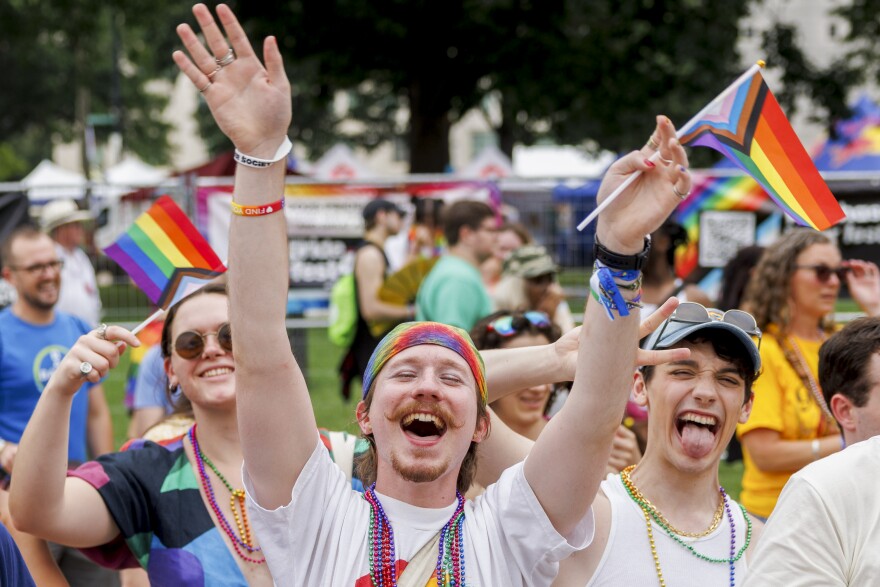Hundreds of families, children and friends waved pride flags, flapped colored fans and cheered for parade crews that drove through downtown St. Louis on Sunday to commemorate the end of this year's PrideFest.
Pride St. Louis, the organization behind the event, is celebrating its 45th year of recognizing the LGBTQ community. This milestone anniversary came with some changes to its festival’s model because of the loss of major funding due to federal pressures on corporations to drop their diversity, equity and inclusion initiatives.
Although the event lost its main sponsor — Anheuser-Busch — festivalgoers still came to participate in the parade and paid the newly introduced $10 entry fee. Some said they were worried about the turnout for the weekend festival but were happy that the community stepped in to support a necessary organization.
“This is something that's so important to this community because we're just looked down upon to everyone else, especially with what's going on in the world right now,” said Liam, who has attended eight Pride festivals in St. Louis.
Liam said the country is trying to make the queer community invisible, even though people of the community have been around for centuries.

With the most recent attacks on LGBTQ rights, especially within health care and education, Kyle Sylcox said the country is regressing and is becoming more fearful.
“The biggest problem and why it's happening is the people who are able to make the decisions that are restricting people like us don't actually know anyone like us,” said Sylcox, who is a first-time festival attendee. “They don't interact with this community. There's no interfacing, so they don't actually even know what we are or like or what we represent.”
PrideFest gives visibility to communities that are marginalized and historically underrepresented, said Marty Zuniga, board president of Pride St. Louis.
“People don't understand what we represent and who we are. That's what makes it so important that we have a Pride this year more than ever, to showcase and to celebrate not only this community, but to inform those people who are not educated and misinformed about who we are as a community,” Zuniga said.
Besides throwing a yearly festival and parade, Pride St. Louis provides hot meals seasonally to the community, offers scholarships to LGBTQ youth and educates people on topics of concern.
Zuniga, who is retiring as president this year, said the organization lost $150,000 in funding from corporate sponsors. That could have been detrimental to the festival, so to fill the gap, the organization created a fundraising campaign. However, he said the organization is preparing for more funding cuts, as some major St. Louis corporations that are supporting the festival this year most likely will not be doing the same next year.
“These regulations are only going to get tighter, and the DEI funding is going away. As we start projecting and forecasting, we can see it … you're going to see less support from these partners,” he said. “I'm grateful for a lot of these smaller ones stepping up, but this is the community's buy-in to say, ‘Look, this is your Pride.’”
Between the two days, the festival sees about 300,000 people. Musicians Flyana Boss, Jordin Sparks, Madison Rose and David Archuleta performed over the weekend.
Parents also brought their children to the festival to support those who identify as LGBTQ and used the festival to teach their children about accepting different identities.

It’s important for children to see what love looks like in any form, said state Rep. Marty Joe Murray, D-St. Louis.
“It’s (PrideFest) everything and going into the future we're going to have to keep fighting because … our youth are the future,” he said while watching his young daughter dancing in a rainbow-colored tutu.
Murray said it will be a hard fight this year in the Missouri legislature since some lawmakers have introduced bills to stop gender-affirming care and bills enact bathroom restrictions for transgender kids.
Attendees said they hope that as Pride Month continues over the years, it will help anyone who is struggling with accepting their identity to learn to boldly embrace themselves.
“[PrideFest] allows us to get people who are seeing us as an other and realize we're just members of the same community that you're in,” Sylcox said, “And we're contributing to your society that you exist in just as much as you are.”
See more photos from the 2025 St. Louis PrideFest from St. Louis Public Radio's Lylee Gibbs.























